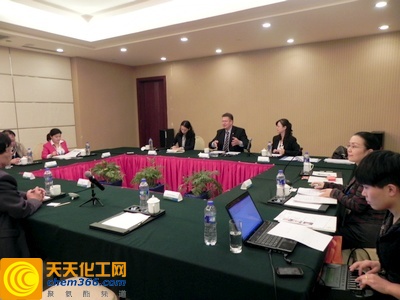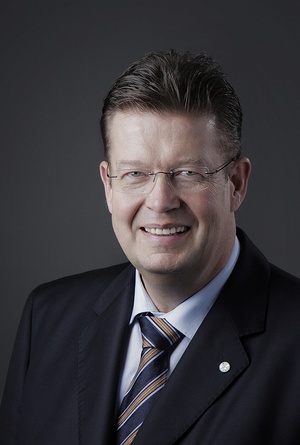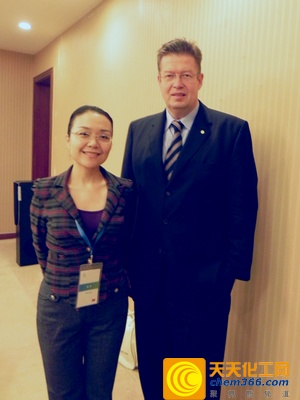On November 16, 2011, Bayer Group held a global press conference in Shanghai with the theme of “Looking to Asia, Focusing on Development”, announcing the company’s plan to further expand the Asian market. At the same time, it was announced that the new TDI production unit of Bayer’s integrated production base in Caojing, Shanghai was officially put into operation.
the
Dr. Xiao Feng, President of Bayer MaterialScience China, had an in-depth communication with the media on the overview of this new device and the development plan of Bayer MaterialScience. Tiantian Chemical Network, as a professional media, participated in this press conference and had a discussion with Dr. Xiao Feng Communicate directly.

(Dr. Xiao Feng answers media questions)
The planned production capacity of the new TDI device at Bayer’s integrated production base can reach 250,000 tons per year. The device adopts a new production process—— Gas-phase phosgenation technology can reduce solvent consumption by about 80% and energy consumption by 60% compared with conventional devices of similar scale. The use of this technology can also greatly save operating costs and reduce carbon dioxide emissions by about 60,000 tons per year. In addition, the new technology can reduce the investment costs of such large-scale installations by about 20%. “The new technology will bring great benefits to the environment and improve energy efficiency.” Dr. Xiao Feng said, “Compared with other production processes, this technology is more flexible and can respond to different market conditions. At present Our factory has not yet reached full capacity, and is in the process of increasing, and will be able to operate at full capacity by the first half of next year.”
the
In addition to the efficient and flexible mode of operation, the safety of the new device also attracts attention. Dr. Xiao Feng introduced to the reporter Bayer’s three-level measures in safety production: “The first level of safety measures is the design of the process; the second level is the actual operation and maintenance of the factory; the third level is the Countermeasures.” Although the safety issue is the most concerned by everyone, Dr. Xiao Feng is full of confidence in Bayer’s safe production: “We have installed a device in the new device. If there is a leak, this device can be well Absorb. Our plants around the world have had a good track record of basically no serious phosgene-related safety incidents over the past three decades or so, so I think our safety strategy is working.”
the
The TDI market in 2011 was slightly sluggish. Under the condition that the raw material market was oversupplied, Bayer TDIHow to continue to maintain its market share and advantages after the expansion of production is what we pay special attention to every day. In response to this problem, Dr. Xiao Feng is very optimistic about the future development of the Chinese market: “The global demand for TDI is about 1.9 million tons per year, with an average The growth rate is 4%-5%. Bayer’s thinking and philosophy is to take into account the needs of the Chinese market and the global market. When the production capacity of a factory in a certain country cannot be fully absorbed by the local market, we will transfer the production capacity of this factory The products are re-exported to other countries. But we believe that as the demand in the Chinese market continues to increase, in a few years, more of our products will be used and digested in the Chinese market.”
the
This year marks the 10th anniversary of Bayer’s establishment of a technology research and development center in China, and Bayer plans to further expand the polymer research and development center in Shanghai into a global research and development center. Regarding the expansion plan, Dr. Xiao Feng said: “Our plan is to double the overall capacity of the Polymer Research and Development Center in Shanghai, including the growth and expansion of the number of employees, laboratory and office space, and R&D capabilities. Our application in China The number of patents has reached 40, and in the future, this number will continue to increase, and the R&D center will use creativity and product experience to help customers launch more newer, more environmentally friendly and more energy-efficient products.”
the
This year, Bayer has moved the global headquarters of its global polycarbonate business to Shanghai. For the integrated production base in Shanghai, which has been successfully operated for ten years, Bayer plans to invest 2.1 billion euros in the first phase. Spend 1 billion euros to significantly increase its MDI production capacity to 1 million tons/year, polycarbonate production capacity to 500,000 tons/year, and build a new HDI production line, increasing its annual production capacity by 50,000 tons. Behind the substantial increase in production capacity is the large-scale investment in capital and technology to achieve Bayer’s sales target of 6 billion euros in Greater China in 2015. (Ling Jia, reporter from Tiantian Chemical Network)

(Dr. Xiao Feng, President of Bayer MaterialScience China)

(Photo by Dr. Xiao Feng and Dr. Zuo Lan from Tiantian Chemical Network)



 微信扫一扫打赏
微信扫一扫打赏
